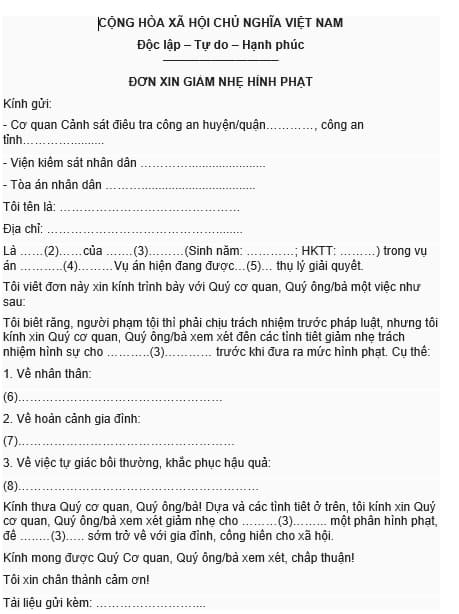Mitigating Circumstances for Criminal Liability: Provisions and Sample Request for Sentence Reduction
Can the Court Consider Voluntarily Surrendering as a Mitigating Factor for Criminal Liability?
Based on the stipulations in Clause 2, Article 51 of the Criminal Code 2015 as follows:
Mitigating Factors for Criminal Liability
...
2. When determining a sentence, the Court may consider voluntarily surrendering or other factors as mitigating factors, but must specify the reason for mitigation in the judgment.
Therefore, when determining a sentence, the Court may consider voluntarily surrendering or other factors as mitigating factors, but must specify the reason for mitigation in the judgment.

What conditions for mitigating criminal liability are stipulated? Where to file an application for mitigating criminal liability?
What are the Mitigating Factors for Criminal Liability?
Based on the stipulations in Article 51 of the Criminal Code 2015 (as amended by point a, Clause 6, Article 1 of the Law Amending the Criminal Code 2017), the mitigating factors for criminal liability are stipulated as follows:
- The offender has intervened to prevent or mitigate the harm caused by the crime;- The offender has voluntarily repaired damage, compensated for the loss, or remedied the consequences;- Committed the crime in a situation exceeding the limits of justifiable defense;- Committed the crime in a situation exceeding the requirements of urgent necessity;- Committed the crime in a situation exceeding the necessary level when apprehending a criminal;- Committed the crime under the influence of mental agitation caused by the victim's unlawful acts;- Committed the crime due to particularly difficult circumstances not caused by oneself;- Committed the crime but did not cause significant harm or caused minor harm;- Committed the crime for the first time and in a less serious situation;- Committed the crime under threat or coercion by another person;- Committed the crime under conditions of limited cognitive ability not caused by oneself;- Committed the crime due to backwardness;- The offender is a pregnant woman;- The offender is aged 70 years or older;- The offender has a severe or exceptionally severe disability;- The offender has a disease limiting their cognitive ability or their ability to control their behavior;- The offender voluntarily surrenders;- The offender is honest, self-reproachful, and remorseful;- The offender actively cooperates with responsible authorities in crime detection or during the resolution of the case;- The offender has made amends through meritorious service;- The offender has outstanding achievements in production, combat, study, or work;- The offender has contributions to the revolution or is a parent, spouse, or child of a martyr.
What are the specifications of the new 2023 application form for sentence, criminal liability mitigation?
The new 2023 application form for sentence and criminal liability mitigation is specified as follows:

Download the new 2023 application form for sentence, criminal liability mitigation: Here
Instructions for filling out the 2023 sentence mitigation application form
(1) Name of the individual or organization receiving the application;
(2) Relationship to the person for whom the application is written (e.g., brother/sister/father/wife/child ...) or the status in participating in the legal proceedings if writing the application directly;
(3) Name of the person for whom the sentence mitigation is requested;
(4) Case information;
(5) Name of the agency currently handling the case;
(6) Provide details on the personal background if there are any of the following mitigating factors:
- Good personal background, first-time offender;- Has many achievements in work;- Family with merits to the Revolution...
(7) Provide details on family circumstances (if any):
- Main breadwinner for the family;- Has young children;- Spouse/children/parents are sick and need care...
(8) Provide a brief description of voluntary compensation and consequence mitigation (if any).
LawNet